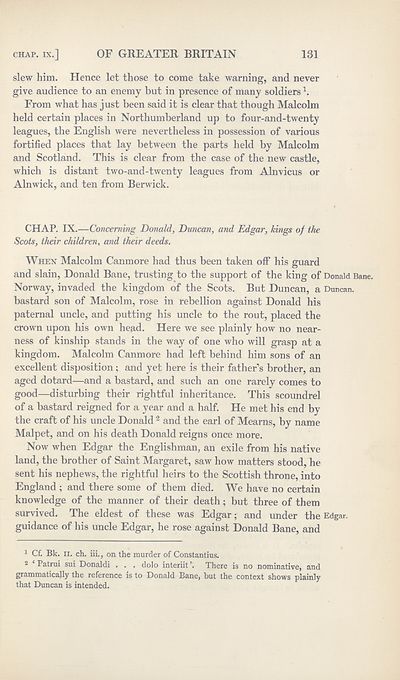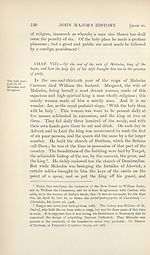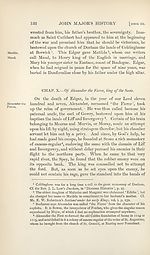Series 1 > History of Greater Britain, as well England as Scotland
(276) Page 131
Download files
Complete book:
Individual page:
Thumbnail gallery: Grid view | List view

CHAP. IX.]
OF GREATER BRITAIN
131
slew him. Hence let those to come take warning, and never
give audience to an enemy but in presence of many soldiers1.
From what has just been said it is clear that though Malcolm
held certain places in Northumberland up to four-and-twenty
leagues, the English were nevertheless in possession of various
fortified places that lay between the parts held by Malcolm
and Scotland. This is clear from the case of the new castle,
which is distant two-and-twenty leagues from Alnvicus or
Alnwick, and ten from Berwick.
CHAP. IX.—Concerning Donald, Duncan, and Edgar, kings of the
Scots, their children, and their deeds.
When Malcolm Canmore had thus been taken off his guard
and slain, Donald Bane, trusting to the support of the king of Donald
Norway, invaded the kingdom of the Scots. But Duncan, a Duncan
bastard son of Malcolm, rose in rebellion against Donald his
paternal uncle, and putting his uncle to the rout, placed the
crown upon his own head. Here we see plainly how no near¬
ness of kinship stands in the way of one who will grasp at a
kingdom. Malcolm Canmore had left behind him sons of an
excellent disposition; and yet here is their father’s brother, an
aged dotard—and a bastard, and such an one rarely comes to
good—disturbing their rightful inheritance. This scoundrel
of a bastard reigned for a year and a half. He met his end by
the craft of his uncle Donald 2 and the earl of Mearns, by name
Malpet, and on his death Donald reigns once more.
Now when Edgar the Englishman, an exile from his native
land, the brother of Saint Margaret, saw how matters stood, he
sent his nephews, the rightful heirs to the Scottish throne, into
England ; and there some of them died. We have no certain
knowledge of the manner of their death; but three of them
survived. The eldest of these was Edgar; and under the Edga
guidance of his uncle Edgar, he rose against Donald Bane, and
1 Cf. Bk. II. ch. iii., on the murder of Constantius.
2 ‘ Patrui sui Donaldi . . . dolo interiit ’. There is no nominative, and
grammatically the reference is to Donald Bane, but the context shows plainly
that Duncan is intended.
OF GREATER BRITAIN
131
slew him. Hence let those to come take warning, and never
give audience to an enemy but in presence of many soldiers1.
From what has just been said it is clear that though Malcolm
held certain places in Northumberland up to four-and-twenty
leagues, the English were nevertheless in possession of various
fortified places that lay between the parts held by Malcolm
and Scotland. This is clear from the case of the new castle,
which is distant two-and-twenty leagues from Alnvicus or
Alnwick, and ten from Berwick.
CHAP. IX.—Concerning Donald, Duncan, and Edgar, kings of the
Scots, their children, and their deeds.
When Malcolm Canmore had thus been taken off his guard
and slain, Donald Bane, trusting to the support of the king of Donald
Norway, invaded the kingdom of the Scots. But Duncan, a Duncan
bastard son of Malcolm, rose in rebellion against Donald his
paternal uncle, and putting his uncle to the rout, placed the
crown upon his own head. Here we see plainly how no near¬
ness of kinship stands in the way of one who will grasp at a
kingdom. Malcolm Canmore had left behind him sons of an
excellent disposition; and yet here is their father’s brother, an
aged dotard—and a bastard, and such an one rarely comes to
good—disturbing their rightful inheritance. This scoundrel
of a bastard reigned for a year and a half. He met his end by
the craft of his uncle Donald 2 and the earl of Mearns, by name
Malpet, and on his death Donald reigns once more.
Now when Edgar the Englishman, an exile from his native
land, the brother of Saint Margaret, saw how matters stood, he
sent his nephews, the rightful heirs to the Scottish throne, into
England ; and there some of them died. We have no certain
knowledge of the manner of their death; but three of them
survived. The eldest of these was Edgar; and under the Edga
guidance of his uncle Edgar, he rose against Donald Bane, and
1 Cf. Bk. II. ch. iii., on the murder of Constantius.
2 ‘ Patrui sui Donaldi . . . dolo interiit ’. There is no nominative, and
grammatically the reference is to Donald Bane, but the context shows plainly
that Duncan is intended.
Set display mode to:
![]() Universal Viewer |
Universal Viewer | ![]() Mirador |
Large image | Transcription
Mirador |
Large image | Transcription
Images and transcriptions on this page, including medium image downloads, may be used under the Creative Commons Attribution 4.0 International Licence unless otherwise stated. ![]()
| Scottish History Society volumes > Series 1 > History of Greater Britain, as well England as Scotland > (276) Page 131 |
|---|
| Permanent URL | https://digital.nls.uk/127735077 |
|---|
| Attribution and copyright: |
|
|---|
| Description | Over 180 volumes, published by the Scottish History Society, containing original sources on Scotland's history and people. With a wide range of subjects, the books collectively cover all periods from the 12th to 20th centuries, and reflect changing trends in Scottish history. Sources are accompanied by scholarly interpretation, references and bibliographies. Volumes are usually published annually, and more digitised volumes will be added as they become available. |
|---|


